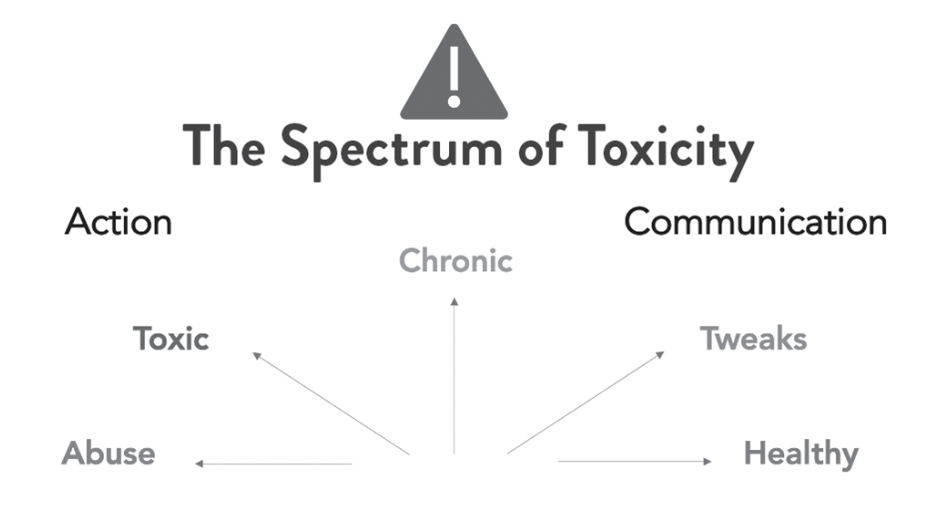As you consider your relationships, recognize that healthy behavior and toxicity exist on a spectrum. Very few people are totally toxic, and no one is entirely healthy. This means that expressing your voice requires nuance and dexterity.
You don’t want to come down with a hammer when a flyswatter is needed. You also don’t want to let someone who is using toxic strategies twist your best efforts.
There’s no one-size-fits-all response when it comes to using your voice and setting healthy boundaries in your relationships. As you consider the many ways to respond to others, consider the example of Jesus.
Jesus navigated through complex relationships with unbelievable skill. Sometimes he left people in order to nourish his own soul. Sometimes he headed straight into hard conversations. Jesus was full of compassion, and he also held people responsible for their behavior. Jesus stood up to bullies, even as he ached for them. He didn’t shy away from calling out people who were hurting others. Jesus even got annoyed with his friends, and he let them know when they’d let him down.
Sometimes Jesus expressed grace. Sometimes he expressed anger. But most of all, Jesus spoke up on behalf of those who were hurting. And you, dear reader, may be the one who is hurting. Sometimes a kind word is needed. Grace will mend the hurt. Other times you will need to advocate for yourself and speak firmly. Finally, there will be times when it’s wisest to walk away entirely. In these situations, the best way to use your voice is to show what you mean through your actions.
How do you gauge what response is required? First, assess where your particular situation falls on the following spectrum.

People who are healthy fall on the right side of this spectrum. These are people with whom communication is possible. You can discuss conflicts or ruptures that occur within your relationship. They’re aware of their blind spots and have a strong sense of self. There is room for conversation and negotiation of boundary lines. In fact, the ability to communicate constructively on behalf of what you need is what makes a relationship healthy. You might not see eye to eye on every single thing. You might even disagree or experience disappointment. For the most part, though, you can arrive at a place of harmony as you negotiate the boundaries of the relationship.
Next, let’s look at the middle of the spectrum. These are the folks who consistently commit boundary fouls but who also have good qualities. For example, you may have a mother-in- law who genuinely cares about your children. At the same time, she won’t respect the boundaries you’ve set when she interacts with them. She’s not toxic, and you want her in your life. But you may have to constantly remind her of certain boundaries or develop workaround solutions to manage behaviors that just won’t change. Likewise, you may have a dad who only talks about himself, or a friend who likes to gossip. They’re not toxic and you can find ways to be together, but your ability to go deep may be limited.
Next, there are folks who show up on the left side of the spectrum. Sadly, these individuals are living out of the worst of who they are. Their choices in response to their painful stories have gotten the better of them, making it impossible to engage with them in healthy ways. As a result, they may demonstrate toxic behaviors toward you that cause great harm. For example, they might attempt to belittle or criticize you, manipulate your decisions, or guilt-trip you. They don’t want what’s best for you. They are worried only about themselves.
Finally, there’s the extreme left side of the toxicity spectrum, which represents those who are abusive. Such people may intentionally try to harm you physically, damage you with words, or gaslight you to make you feel crazy. Folks who are spiritually abusive will try to get you to think God is on their side. These actions on the left side of the spectrum are major boundary violations. Their behavior cannot and should not be tolerated.
Here are some examples of strategies someone might use to gaslight, control, or manipulate you.
GASLIGHTING
- “I didn’t borrow your phone. Why are you always blaming me?” (In fact, they did borrow the phone.)
- “I’m not drinking! You have trust issues.” (In fact, they have started drinking again.)
- “I never said those things. You must have misheard me.” (In fact, they did say those things.)
- “I’m not mistreating you. You have an issue with authority. You need to pray and ask God to change your heart.” (In fact, they are mistreating you.)
MANIPULATION/GUILT-TRIPPING
- “You don’t really care about me.”
- “I know how busy you are; I guess you don’t have time for me.” • “If you really loved me you’d . . .”
- “If you really loved God, you’d . . .”
CONTROLLING
- “I forbid you to see that therapist/friend/family member anymore.”
- “If you break up with me, I’ll tell everyone who you really are.”
- “You can’t survive without me. I own the finances.
- “God has given me authority over you.”
Make no mistake, these are big red warning lights. You can’t change the other person. So, you must learn to protect yourself. When it comes to toxic behaviors—words won’t work. With toxic behaviors, very word you say is going to get stuck in a web of confusion. In these cases, actions speak louder than words ever will.
 To learn more about how to break free from painful patterns, mend your past, and discover the healthy relationships you crave, check out my new book, The Best of You.
To learn more about how to break free from painful patterns, mend your past, and discover the healthy relationships you crave, check out my new book, The Best of You.
For over two decades, psychologist and author Dr. Alison Cook has earned the trust of thousands of women through her practical, wise, and compassionate approach to becoming a whole person. Her most recent book is The Best of You: Break Free from Painful Patterns, Mend Your Past, and Discover Your True Self in God (Thomas Nelson).
Originally from Wyoming, Alison studied at Dartmouth College, Denver Seminary (MA), and the University of Denver (PhD), where she specialized in the integration of theology and psychology. She and her husband, Joe, are the parents of two young adult children, and are currently based in Boston.



















0 Comments